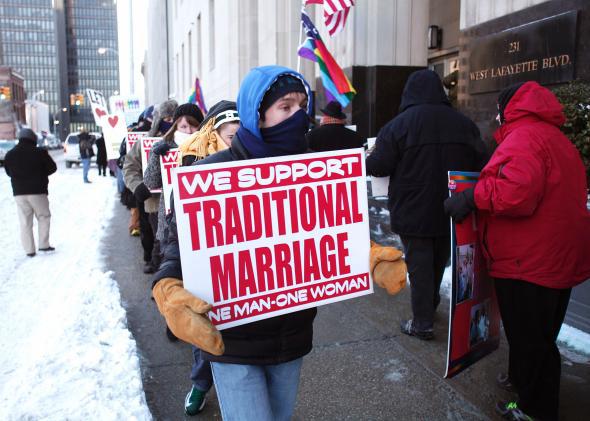Editor’s note: On May 20, 2015, it was revealed that this study was based on fabricated data.
On Friday, the journal Science published a buzzy new study suggesting that homophobia is more of a minor, curable malady than a chronic illness. For the study, researchers sent gay and straight canvassers into strongly anti-gay neighborhoods and directed them to converse with residents for about 20 minutes about why marriage equality mattered to them. The result: Residents’ support for gay equality increased considerably—and those residents who spoke with gay canvassers retained their pro-equality beliefs nine months after the conversation.
This “transmission of support for gay equality” endured only when residents spoke with gay canvassers, however—straight canvassers yielded an initial pro-equality boost but failed to produce long-lasting effects. The study, then, essentially reinforces an intuition that the LGBTQ community has held for decades: When homophobes experience compassionate, individualized interaction with a gay person, they tend to shed their homophobia.
It’s nice to have a scientific study confirm what so many gay people already suspected. But the Science piece comes at a tricky moment for what my colleague J. Bryan Lowder calls the “ ‘hearts and minds’ model of social change.” Ever since gay marriage started winning at the ballot box, our more faint-hearted allies have encouraged gay people to be “tolerant” of those who hate us and vote against our rights. We should, these (usually straight) people scold, let our opponents denigrate and humiliate us all they want, without ever raising our voices or asserting our dignity. Then, once we’ve been thoroughly debased and degraded, we should gingerly plead with those who despise us to please, please despise us just a little bit less.
Like Lowder, I think this advice—especially coming from self-described “allies” who’ve never experienced real prejudice in their lives—is profoundly condescending and exasperating. And yet, looking at the Science study, I also wonder whether it might contain a kernel of truth. Gay people having nonconfrontational, nonjudgmental confabulations with homophobes really does appear to be the single most effective way to further the cause of equality. It would seem, then, that gays have something of a duty to engage with people who, deep in their hearts, believe we deserve second-class citizenship.
Look, I don’t like it either. But after the Science study, I don’t see a way around it. Gay people have to keep engaging, passionately and sympathetically, with the obdurate holdouts who think we are perverted, or diseased, or undeserving of rights. It’ll be a long, unpleasant slog—but I’ve devised a plan to incentivize the process. Below, I’ve gathered a few of the most goofily anti-gay articles I have encountered. Think of these articles as the opposition. And then remember: If a gay person had spoken to the author for 20 minutes, this train wreck could have been avoided!
“The Rise of the Same-Sex Marriage Dissidents,” by Mollie Hemingway.
In this absurd article, Hemingway compares gay marriage to “totalitarianism” and brands gay marriage opponents (like herself) as “dissidents” engaged in the “fight for freedom.” She also analogizes gay-friendly America to communist Czechoslovakia, implying the Vaclav Havel would be horrified by our current pro-equality climate. (Havel, by the way, strongly supported gay rights.) Just think: This bumptious piece of self-glorification could’ve been avoided if Hemingway had spoken to a gay person on the Metro ride to work!
“Dred Scott and Same-Sex Marriage,” by Matthew J. Franck
Franck gives six very silly reasons why “the judicial imposition of same-sex marriage” is similar to the Supreme Court’s catastrophic Dred Scott decisions, holding that slaves were property and not citizens. “Like Dred Scott,” Franck writes, “same-sex marriage rulings are a harbinger of further depredations, by courts and others, on human freedom in other dimensions. In 1857, it was the freedom to live in a country where slavery was minimized and at least arguably on its way to extinction. Today, it is the freedom to live, work, and learn in communities, schools, universities, and other organizations in which people can live the truth about marriage, for religious or other moral reasons.”
Presumably, Franck believes that “the freedom to live, work, and learn in communities” that recognize “the truth about marriage” means the freedom to never interact with gay people. Or maybe he believes that “freedom” means the freedom to actively deprive gay people of civil rights. Who knows? This garbled claptrap never should’ve made it past a copyeditor. And if only Franck had had a gay nephew who spoke to him about the importance of marriage over Thanksgiving dinner, this gibberish never would’ve seen the light of day.
“Gay Marriage and the Right to Be Wrong,” by Robert Tracinski
Of LGBTQ nondiscrimination ordinances, Trancinski writes: “This is a barbaric concept of victory. [Gay activists have] won the battle, and now the defeated enemy must be paraded in chains through the streets and forced to kneel before the emperor.” Quite a statement! If only Tracinski’s college buddy had gently come out to him at their most recent reunion. All those great times he had—with a gay person! Surely gay rights wouldn’t have seemed so “barbaric” to Trancinski then.
“The Terms of Our Surrender,” by Ross Douthat
Douthat paints homophobes as principled, noble victims of a vicious, unfair system and rebrands anti-gay animus as virtuous “dissent.” He also suggests that, since the Bible’s hostility toward gays is more pronounced than its hostility toward blacks, anti-gay discrimination is much more justifiable than racism.
In 10 years, the New York Times will regret printing this article. The paper will be even more embarrassed when it realizes that, had it simply sent an openly gay editorial intern into Douthat’s office to chat for 20 minutes, “The Terms of Our Surrender” would never have made it to press.
